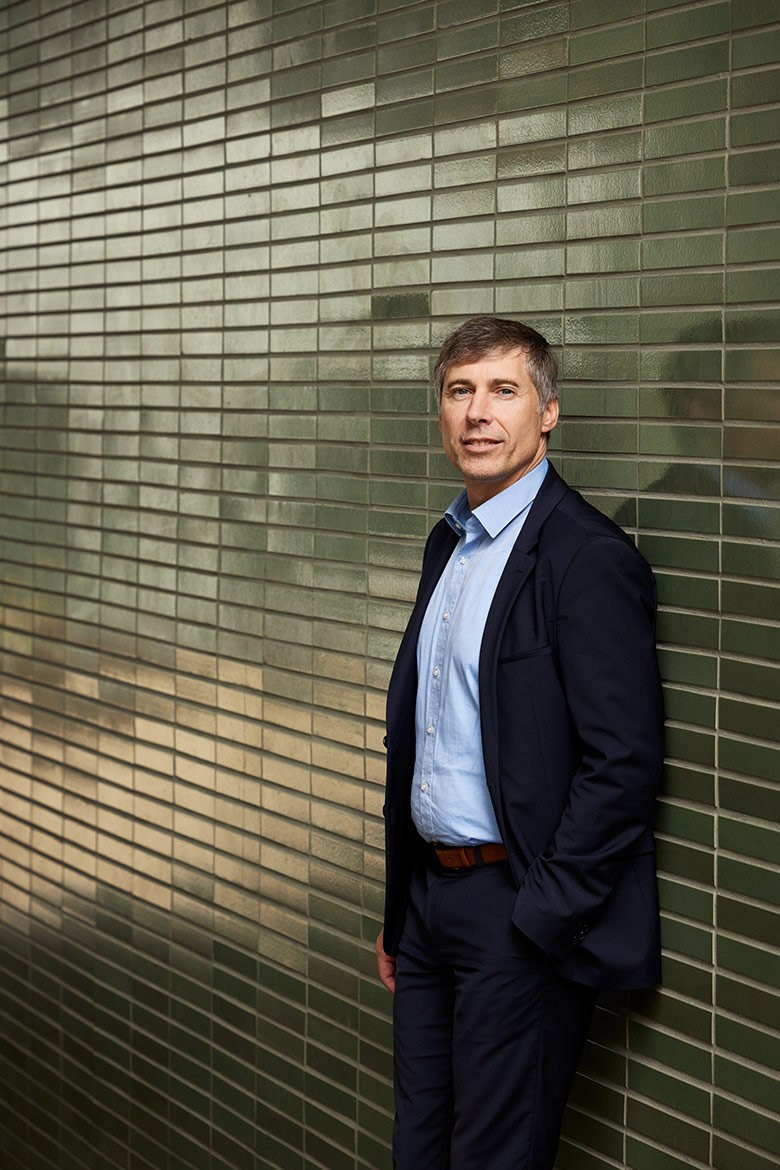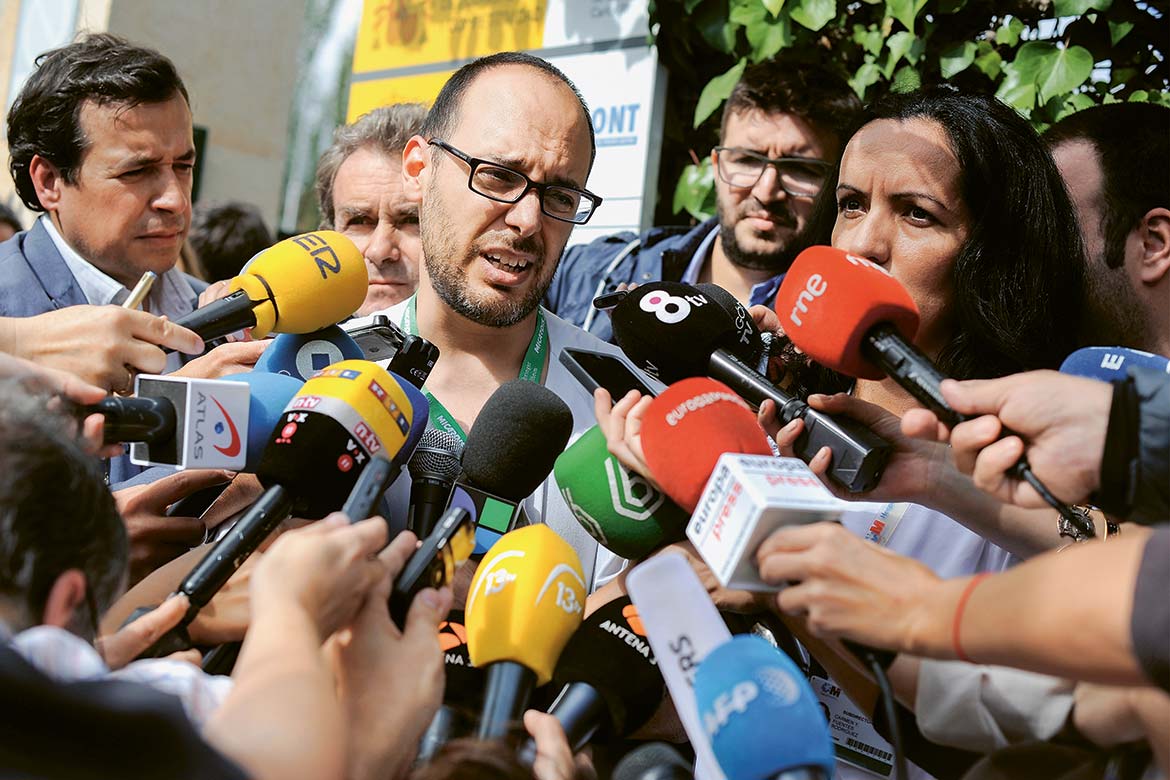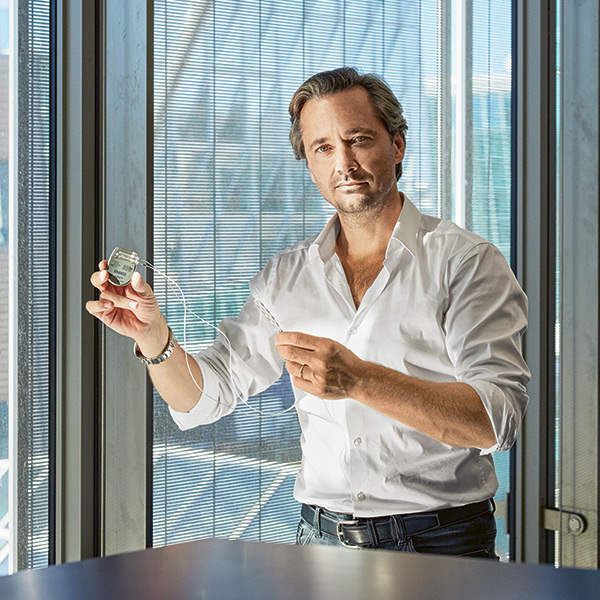Portrait
Getting to grips with evil
Dirk Baier is a criminologist who researches into policing, extremism, xenophobia and hostility towards the State. He has known violence since childhood. But he remains upbeat, despite his unyielding gaze into the abyss.

The criminologist Dirk Baier was assaulted by his father when he was a child. Today he’s engaged in comprehensive research into violence in our society. | Photo: Mara Truog
“No, I’ve never seen a monster. They’re human beings of flesh and blood with two eyes, a nose and a mouth”. Dirk Baier is a criminologist at the University of Zurich and also heads the Institute for Delinquency and Crime Prevention at the Zurich University of Applied Sciences (ZHAW). He smiles in a friendly manner and presses the button for the lift a second time. “When you’re sitting opposite someone who’s killed another human being, you can’t tell by looking at them. They’re someone with normal dreams. They’re not evil to the core”.
Here in the brutalist concrete and glass complex that is the Toni Campus of the Zurich University of the Arts in Zurich West, his institute is ‘tolerated’ rather than being actively accepted by the creative types who occupy most of the rooms. His office, he says, is in “one of the farthest corners of the building”. He grins.
He usually sits in one of the offices here, preparing social science surveys that are then sent off as Internet links, sometimes in collaboration with an opinion research institute. It’s not exactly the exciting stuff a journalist interviewer hopes for. There are no jungle expeditions to report on here, not even any laboratory studies. Baier also rarely talks to offenders face to face. The most recent instance was in an external residential group of Hindelbank Prison, where offenders are guided back into freedom after being incarcerated. “The space between me and the crime is usually taken up by a questionnaire”, he says.
Humanity is getting more civilised
Baier talks in headlines, straightforward and to the point, though in a broad Saxon dialect. It’s hardly surprising that the Swiss newspapers – from 20 Minuten to Blick and the Tages-Anzeiger – are always so keen to learn his opinion on the excesses of our society. Even Germany’s media want to know what he thinks. Sometimes he’s asked about anti-Semitism among young people, at other times about women who abuse their children, or why people push others onto railway tracks. The cases range from murdered joggers to ‘knife-wielding migrants’, violence against the elderly, spitting at politicians, police violence or just the general “aggressive mood” in society, as Swiss Radio SRF has quoted him.
Baier seems to be a veritable polymath about violent behaviour – indeed, about uncivilised behaviour of all kinds. But he comes across as upbeat: “There are now eight floors between us and the interview. Eight-and-a-half, to be precise. The lift keeps you waiting too long”. So we take the stairs. “Then at least we’ll be warm. That’s nice”.
He says that he learned early on to emphasise the good in the bad. He does it both in his research and in his work with the media: “We criminologists don’t always just bring bad news”, he says. “Studies have shown that humanity is becoming more and more civilised – despite outliers such as wars”. He adds that interpersonal violence has actually been declining gradually since the Middle Ages.
Once we’ve arrived – out of breath – in one of the bare, shared offices upstairs, he starts to explain. Many people have a different image of our world today, one of brutalisation and danger. “Ah, but individual cases of brutality don’t describe the big picture”, he says. “And we sometimes forget that. The flood of news makes it difficult for us to categorise such instances by asking: Where did the crime happen? How many crimes were there? And how bad were they?”.
Politicians are swift to instrumentalise these things: “‘There’s been a crime!’, they say. ‘We have to do something straightaway!’” This is followed by calls for draconian punishments, even though studies suggest that they often don’t make sense. “It’s difficult to negotiate the level of punishment that society should impose”, says Baier. “I’m trying to do my bit, and see my contribution as monitoring what’s really happening out there. I’ve made it my job to call things by their name and, if necessary, to set the record straight. We are currently living in a phase of increasing criminality. But mostly we’re seeing an increase in property offences. Sometimes a wallet is stolen, or someone’s car is broken into. In the long term, however, we are observing a decline in physical violence”.
When the media ask him for his assessment, he refuses to cater to any sensationalism. As an example, he mentions the instances in Switzerland when foreigners are accused of committing crimes. “You read a lot about so-called ‘foreign criminals’. But foreigners don’t usually rob anyone. They just pick up what’s lying around, so to speak. So lock your car!” In any case, this isn’t the behaviour exhibited by the majority – “though that fact is completely ignored in media reports”. When Baier tackles emotionally charged topics like these, stepping out of his ‘comfort zone of science and scholarship’, he himself often becomes a victim of verbal violence. He’s been called a ‘whore of the system’ online and has been sent emails telling him how stupid he is. But he insists that it’s worth the unpleasantness if it means he can bring research findings into society at large.
The dangers of hostility to the State
It’s the people who’re in the thick of it who suffer far worse, he says. Like police officers – a group that is currently a subject of Baier’s research. “We are busy with a repeated survey of everyone currently in training. Research suggests that they undergo an increase in xenophobic attitudes during this time. This is something that we want to examine in Switzerland, along with many other topics”. His preliminary study, with around 80 participants, has shown that prospective police officers start out with a very high level of motivation, firmly convinced that they can do something good, but that this quickly dissipates. Yet they are generally less xenophobic than the rest of the population, they express greater satisfaction with democracy, and are less prone to believe conspiracy theories.
It’s conspiracy theories that are a general concern of Baier’s, and they’re also one of his research topics. “Corona made this phenomenon more visible. We’ve kept our eye on it, and have realised that this kind of thinking isn’t going away. Those who refuse to accept the authority of the State are very active and have a broad network. They have large chat groups on the messenger service Telegram. In a recent survey, we found that the proportion of people who are hostile towards the State is continuing to rise”.
The notion that something’s simply wrong and that foreign powers are behind it all can easily be transferred onto everything else, he says, from nuclear power to wars, the climate or the gender debate. “The willingness of these people to resort to violence is ten times higher than in the general population, as we discovered in a survey on violent extremism. Some of these people are just about foaming at the mouth and are stockpiling weapons”. There’s no need to put people under blanket suspicion, but we have to take these groups seriously, says Baier. We have to keep our eye on them, and those in authority need to be sensitised to the fact that such a hermetically sealed-off world view really exists. Thirteen years in the old East Germany and the turmoil of the post-reunification period were enough to prove to Baier why democracy and freedom are really worth protecting.
Baier seems to have an answer to every question. So are human beings simply predators? He replies that we lose our inhibitions in certain situations, though this is a hypothesis that can’t be tested because humans always live in a group, and this sets boundaries on our behaviour. Are men more brutal than women? “They’re different”, he says. When men use violence against women, it’s to possess them. Women use violence against their husbands to free themselves. So who among us will resort to violence? He says that many of us have already experienced violence in childhood.
But not everyone becomes a violent father, and he offers himself as the best example: “I can still see the stairs of our house. I’m about seven years old, and my father, an overly large man, comes up to me, grabs me and beats me as he drives me up the stairs”. At some point, his mother asked him if he wanted “a new dad”. He says he shrugged his shoulders and answered: “Yes”. The violence stopped when his parents separated.
I’ve one last question. What if someone committed a violent act against a daughter of his own? He thinks about it. “Every now and then, I imagine what I’d want to do to the perpetrator. People have violent fantasies, me included. I’m an anxious father”, he says. “But I know from research that the families of victims first have to come to terms with their suffering. They have to trust the justice system. Punishing offenders harshly is of secondary importance to their victims”. He’s a positive-thinking person, he says. “Violence doesn’t simply happen from nothing. Everything has a cause. People are not bad. That helps me. And it also helps to see that most people stick to the rules. You’d be surprised how many!”




